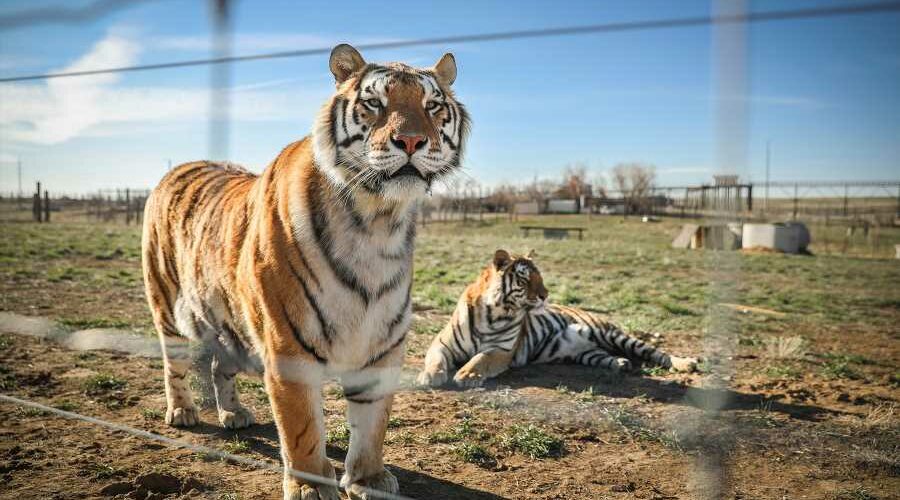Grrrrrreat! House Passes Bill to Safeguard Big Cats
Big cats rejoice, the House passed a resolution that would ban breeding big cats, including tigers and lions, by private owners or for commercial “cub petting” ventures.
Advocates who have long sought an end to private breeding of exotic animals as pets or as performance animals are celebrating the passing of The Big Cat Public Safety Act. The new act would close loopholes in the 2003 Captive Wildlife Safety Act, which banned the sale and trade of big cats as pets. The new resolution bans the private breeding and possession of tigers, lions, leopards, and panthers, making exceptions for zoos, sanctuaries, and colleges.
The bill, brought forth by Mike Quigley (D-Ill.) and Brian Fitzpatrick (R-Pa.) has been cosponsored by 259 representatives, including 52 republicans, and was adopted in a vote of 278-134. A joint statement released Monday by several animal welfare organizations implored congress to “finish the job and close loopholes.”
Related Stories
Doc Antle, Zoo Owner from 'Tiger King,' Indicted for Alleged Wildlife Trafficking, Money Laundering
Kate McKinnon's Carole Baskin Declares War Against Joe Exotic in 'Joe vs. Carole' Teaser
Related Stories

The Who's 50 Greatest Songs
Album Guide: Metallica
In a statement to Rolling Stone, Rep. Raúl M. Grijalva, Chair of the House Natural Resources Committee, explained that “Far too often, the people who own and breed lions, tigers, and other wild cats aren’t doing it because they love animals—they’re doing it because they know they can make a quick buck with photo ops and other problematic tourist traps.” Grijalva said that the animals trapped in these operations are given “the cheapest care and the lowest standard of safety” by owners, “putting both these creatures and people at risk.”
“I’m proud to see so many of my colleagues on both sides of the aisle recognize the importance of this legislation,” Grijalva added, urging his colleagues in the Senate to usher these “commonsense protections for these animals and ourselves into law.”
Animal welfare advocates believe that placing controls on the breeding, sale, and ownership of exotic animals is not only vital for animal welfare but for the preservation of public safety. Private ownership of exotic animals of all varieties has resulted in deaths, maulings, and escapes that often result in law enforcement having to euthanize the animal involved. In 2011, dozens of animals, including lions, tigers, monkeys, bears, and wolves, were intentionally released from a private zoo in Zanesville, Ohio. Law enforcement was ultimately forced to kill 48 of the animals.
While the Big Cat Safety act does ban breeding of large exotic cat species, it does not require that current private owners of these animals surrender them. Current owners will be allowed to keep their animals if they register with the U.S. Fish and Wildlife Service.
Executive director at Animal Wellness Action in Washington, D.C., Mike Irby thinks the bill, which was backed by the National Sheriff’s Association, will aid law enforcement agencies in identifying abuse, disrupting illegal breeding and trade operations, and being better prepared for encounters where dangerous animals may be present. “In a perfect world, we wish those cats weren’t in neighborhoods and private homes,” says Irby.
“Ultimately, this legislation is about public safety,” says Rep. Quigley, the bill’s co-sponsor. “These are predators, not pets. Law enforcement has long advocated for legislation that will keep dangerous wild animals out of their communities and reduce the risk to first responders and the animals themselves.”
While the issue of animal welfare has a long legislative history, the 2020 Netflix series Tiger King put a spotlight on rampant animal abuse taking place within the exoctic animal industry, including the mass breeding of big cats like lions and tigers for commercial purposes.
At the height of his business ventures, the protagonist of Tiger King Joe Exotic (legal name Joseph Maldonado-Passage) owned around 200 large breed cats. Exotic bred large cats and their hybrids for lucrative “cub petting” shows, and had to manage dozens if not hundreds of large adult cats inevitably produced by his venture, often selling them, illicitly, to private buyers. The series documented the dangers of working with the animals, including the mauling of an employee who eventually lost their hand, as well as instances of cats biting Exotic and other employees interacting with them.
Exotic was ultimately imprisoned on 17 charges of animal abuse and two counts of attempted murder-for-hire related to a plot to kill Big Cat Rescue sanctuary owner Carole Baskin. Other individuals featured in the docuseries have also been arrested and charged with wildlife trafficking and animal cruelty, including Bhagavan “Doc” Antle (for viewers: the guy with all the wives).
Irby feels that the show helped catapult the work of big-cat advocates into the public eye. “Tiger King was a huge part of this bill getting the attention” it needed, says Irby. “We’ve had so much momentum, we had great meetings with members that are typically not on our side.”
Having triumphed in the House the bill now faces its next challenge in the Senate. “For too long, lax laws have allowed private citizens to own big cats,” says Quigley. “The animals subject to these grotesque conditions deserve better. I hope my colleagues in the Senate will swiftly take up this legislation so we can make a difference for communities across the country and save these animals from a life of confinement and restriction.”
Source: Read Full Article

